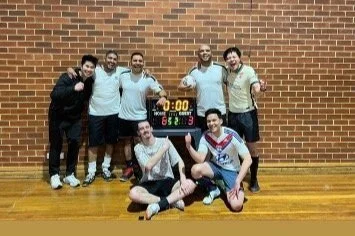From Strangers to Champions: The Remarkable Journey Fuelled by Human Connection
By Arnold Ho
Check out this picture of my Tuesday Men's Futsal crew, proudly rocking the championship title in Flemington Monday’s Men's League!
But what this picture does not tell: this team was born out of a bunch of random guys crossing paths. More about this later.
So why am I sharing this here? In a world where teams are constantly shifting, teams are needing to perform quickly without much time together.
Think of your own teams that you have been part of or led, how much change in personnel has there been just in the past year? Also, I am guessing you have had the conversation about needing to start performing as a new team.
The story of my Futsal team has some lessons to provide you to help accelerate the process of achieving high performance in your team.
Trust is catching the ball of vulnerability when it is passed to us
In one of the first games of the season, Anth (our star player) found some space with the ball at halfway, on the side of the pitch, Jase (our Inzhagi-esque striker) yells out “Have a dig, son!” Anth without hesitation, affirms the position and takes a winding shot from halfway. Full of power but lacking accuracy the ball goes flying out. Our team erupts in cheers and laughter. Though the shot missed, the combination of the catchphrase, the shot, and the response said more to the team than any words ever could. “When you take risks, we have your back.” And we continued to affirm this all season long.
How we respond to risks taken by people in your team, sends a strong message of whether trust can be found here. When people think about whether they have a high-trust environment in their teams, it is these intangibles that we are talking about and could be locking up some of the ingenuity the team has to offer.
Showing Care can be Simple and Makes People Feel Valued
I cannot remember when, but early on we decided to create a group chat so we could coordinate payments and have numbers to play. What we did not realise was that it would become more than that. It became a tool for team bonding, but more specifically it became a way to show care. And it was not anything weird and overtly emotional, but simple. From a tear emoji when someone could not play or a love heart when someone was making a return to the team, to funny gifs that re-enacted a play on the night or wishing the team luck. These little things all helped the team feel cared for and set the tone for how we rolled.
There are always little opportunities to demonstrate care in your teams. It could be giving out praise, checking in on someone who might be quieter than usual, asking about something someone shared about personally. These small actions tell people that they are valued. A study in 2012 by APA showed that individuals feeling valued meant better well-being and performance.
Goals! Not Just Scoring Them
Yes, we indeed score many goals- about 118 all season. But what I mean is staying on the same page during the game. Mini goals. Whether that was marking up a key player, playing an extra pass, or shooting more often. On the back of the previous two pillars, everyone felt secure to set the direction for the team based on what they were seeing in their position. There was no explicit captain on the team, no coach, just everyone contributing a voice to what our goals should be throughout the game.
Amid the age of complexity that we are in, we are faced with many situations where course correction is required. High-performing teams need to hold space for frequent course correction to stay on course towards the mission whilst still taking opportunities.
After finishing the season second, we got into the finals after an extra-time screamer by who else but Ash (appropriately nicknamed Bangers and Ash for his bangers-only MO). With confidence behind us, we marched into the finals. We did not necessarily have the most talented players, but we were united, and it made everyone faster, bigger, and stronger on the pitch. And that is how it played out as we comfortably swept side our opponents to win the championship 6-3.
At the end of the game, we reflected on the season and that is when the conversation of who started the team came up. As each of us responded with “Nar, I thought it was your team” it dawned on us that it was none of our teams and that we had come together as fill-ins. However, this dynamic did not hinder us, in fact, it became our competitive advantage, and everyone stepped up as needed to keep the team going.
Whilst there is a role for explicit leadership, what I took from this experience was that there is a way for leadership to occur anywhere in a team and in fact, increasing complexity demands leadership from wherever the situation requires.
We foster this through some simple human actions of catching each other in our vulnerabilities, showing genuine care and holding space to clarify goals regularly.
